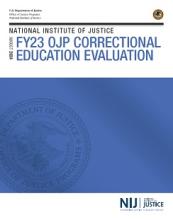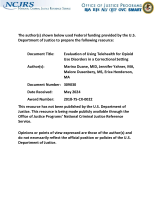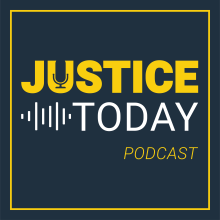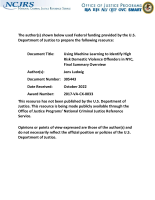University of Chicago
NORC Research Brief: National Study of Victim Compensation Programs Barriers and Challenges to Compensating Victims of Crime
An Evaluation of Crime Victim Compensation in New York: Part of a National Study of Victim Compensation Programs
NORC Research Brief: National Study of Victim Compensation Programs Findings and Recommendations
NORC Research Brief: National Study of Victim Compensation Programs Perceived Fairness of Outcomes Among Claimants
An Evaluation of Crime Victim Compensation in Delaware: Part of a National Study of Victim Compensation Programs
An Evaluation of Crime Victim Compensation in Arizona: Part of a National Study of Victim Compensation Programs
Research, Evaluation, and Analysis of Call Handling on Three-Digit Hotlines (REACH-3D)
Randomized Controlled Study of the EMPOWER Program to Prevent Abuse and Financial Exploitation of Older Adults
FY23 OJP Correctional Education Evaluation Package
Evaluation of Using Telehealth for Opioid Use Disorders in a Correctional Setting
Looking Beyond Recidivism: New Research on Well-Being in Prisons and Jails From the National Institute of Justice
911, What's Your Emergency?: Factors Impacting Call Coding
Domestic Terrorism Targeting America’s Political Elites
Meeting People Where They Are to Improve Institutional Culture
Meeting People Where They Are to Improve Institutional Culture
Incarcerated individuals deserve opportunities for healing and growth, but they often lack the necessary resources for such opportunities. Additionally, organizational cultures that don’t support these outcomes often stand in the way. Researchers and practitioners gathered at NIJ’s 2023 National Research Conference to share ideas and projects that will increase opportunities for incarcerated populations around the country. This show continues their conversation.
Campus Sexual Assault Responses (CSAR): Informing Trauma-Informed Policies, Protocols, and Training
Sexual violence is a significant criminal justice problem with long-term effects for its victims. In particular, sexual assault on or related to college campuses across the United States presents a growing public health and economic burden, starting with significant impacts on academic outcomes.
See the YouTube Terms of Service and Google Privacy Policy
Using Machine Learning to Identify High Risk Domestic Violence Offenders in NYC, Final Summary Overview
Formative Evaluation of a Hospital-based Violence Intervention Programs and Victim Services in Chicago
Crime and Justice: A Review of Research, Volume 30
Firearms Regulation: A Historical Overview (From Crime and Justice: A Review of Research, Volume 28, P 137-195, 2001, Michael Tonry, ed. -- See NCJ-192542)
Learning from Doing Evaluating the Effectiveness of the Second Chance Act Grant Program
Reauthorized in 2018, the Second Chance Act (SCA) aims to reduce recidivism and improve outcomes for people returning from state and federal prisons, local jails, and juvenile facilities through the provision of federal grants. During this panel, National Institute of Justice-funded researchers will detail two ongoing evaluations of the SCA grant program:
- An evaluation of the effectiveness of the SCA grant program per Title V of the First Step Act.
- A longitudinal examination of the long-term impacts of the SCA program.
See the YouTube Terms of Service and Google Privacy Policy









